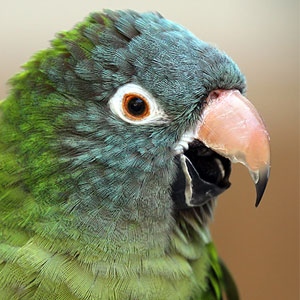
Training your Bird to Stop Screaming
Birds are naturally vocal in the wild. Some birds chatter, while others whistle. Bird owners need to realize that a certain amount of screaming is normal. But what if your bird excessively screams?
The first step to reduce screaming is to distinguish between your bird's screams. Is he screaming because he actually needs something? Be observant and listen to his calls so you know when he needs you. Is something alarming your bird? Try to eliminate it by moving his cage or taking other necessary steps. However, if your bird's screams no longer carry any meaning, there are a few steps that you can take to try and reduce the screaming.
- Ensure that your bird is staying entertained. If your bird is lonely or bored, he will be more likely to scream for attention. Give him toys with a variety of textures and colors, and rotate toys often.
- Make sure he is receiving sufficient amounts of sleep each night. Birds tend to like consistency, so keep him on a regular schedule.
- Confirm that your bird is receiving proper nutrition and ample opportunity to forage. Foraging will provide your bird with mental stimulation and an outlet for pent-up energy.
- Take time to talk to your bird and give him the attention he craves. If you are gone or ignore him all day, he might become upset and start screaming for attention.
- As a substitute for screaming, teach your bird a more desirable behavior. For example, you could encourage your bird to call you in a more acceptable way, such as calling "Hello" when he wants attention. If you start using a certain call with your bird, he will likely start using it too. Reward him when he starts using the acceptable call. Positive reinforcement is key in teaching desirable behavior. Consistency is key!
- Don't become dramatic and give your bird attention if he is excessively screaming. If you run to your bird's cage every time he screams, he knows screaming gets him attention. When he takes a break from screaming, even for a second, talk to him nicely. Hopefully, he will start associating his quiet behavior with your positive attention. Have patience—this will take time.
Many people think that covering their bird's cage helps. This might solve the issue for the moment; however, this tactic will not prevent future screaming. Remember that breaking a bad habit takes a lot of time and effort. Unfortunately, the situation might become worse before it resolves, especially if you let your bird get away with screaming before. Never yell at or punish your bird. Yelling or screaming at him will only teach him that screaming is acceptable.
Some birds love to scream just for the sake of hearing themselves scream. This could be related to an obsessive-compulsive behavior or past abuse. If you think that your bird might be screaming for self-stimulation, ask your avian veterinarian for advice and guidance.
Discover More!
How to Train a Bird Using Positive ReinforcementHow to Teach a Bird to Talk
Ensuring Your Pet Bird Receives an Adequate Sleep
Pet Bird Nutrition
The Necessity of Exercise for Birds
Providing Your Bird with Intellectual Stimulation
The Importance of Bird Foraging
Return to Bird Articles


